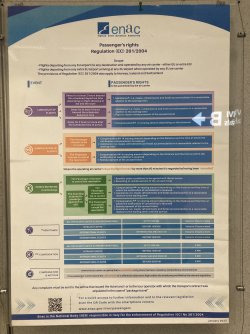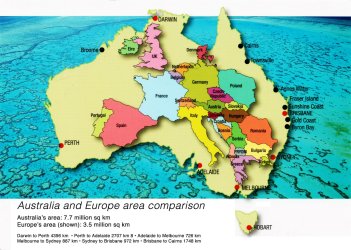This flight is due to depart at 11:25 from ADL to CBR. As the morning rolled along I recevied a number of updates of pushing back the flight departure, first to 11:40, then 12:50 (advised at 11:45); then 13:25 (also advised at 11:45); then 13:40 (also advised at 11:45); then two more updates of the 13:40 departure. Our actual departure was at 13:44 and arrival into Canberra at 15:27 (thanks to a tail wind), though we ended up waiting for 10 mins for a gate, arriving at the gate at 15:40.
As a "group 1" under EU261, flight passengers would be entitled to a meal voucher as well as a reason for the delay. While passengers were told of a "technical difficulty" at the gate at 11:15, there was no further update until a change in gate and the boarding of a new aircraft at around 12:45. It was possible at about 13:00 to get a refund from the app, but the paucity of flights between ADL and CBR made this unrealistic. Speaking with other passengers, there was no offer of any food vouchers.
EU261 also provides for compensation for delays over €250 (AUD407) if the passenger's actual arrival time exceeds the scheduled arrival of their originally booked flights, by two hours for type 1 flights.
I think this later compensation charge would have provided the impetus for Qantas to move us to a different plane sooner than the two hour delay.
And isn't that the point of a compensation scheme like EU261 - it provides a positive incentive for airlines to solve problems.
As a "group 1" under EU261, flight passengers would be entitled to a meal voucher as well as a reason for the delay. While passengers were told of a "technical difficulty" at the gate at 11:15, there was no further update until a change in gate and the boarding of a new aircraft at around 12:45. It was possible at about 13:00 to get a refund from the app, but the paucity of flights between ADL and CBR made this unrealistic. Speaking with other passengers, there was no offer of any food vouchers.
EU261 also provides for compensation for delays over €250 (AUD407) if the passenger's actual arrival time exceeds the scheduled arrival of their originally booked flights, by two hours for type 1 flights.
I think this later compensation charge would have provided the impetus for Qantas to move us to a different plane sooner than the two hour delay.
And isn't that the point of a compensation scheme like EU261 - it provides a positive incentive for airlines to solve problems.















